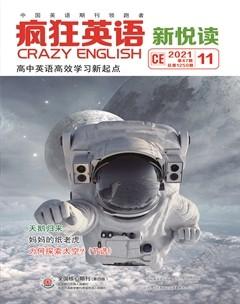Task 6
本刊试题研究中心
What is the biggest fun you can have in 21 hours and 23 minutes? On 15 October 2003, Yang Liwei answered this question. His 1 in space took him 600,000 kilometers in orbit (軌道), around the Earth 14 times, in just over 21 hours. It made him Chinas first astronaut in space. He had worked towards this goal for many years.
Born in 1965, Yang had wanted to fly since he was a young boy. His friends and teachers have all said that he 2 science and technology from a young age. He always had a(n) 3 of flying.
In 1983, he joined the army and went to a flight school. He 4 in 1987 and became a pilot. In 1998, he 5 to be a member of Project 921, which is now called Shenzhou. He was one of the only 14 6 from 1,500 candidates (候选人). The team spent the next five years being 7 . They not only studied all the subjects 8 to be an astronaut, but also learned 9 skills and all about how spaceships and rockets are built. Yang scored among the very 10 in everything the group studied.
In September 2003, only three out of the 14 candidates were 11 for the Chinese space adventure, and Yang was one of them. He took all kinds of tests to 12 he was fit for this important task. 13 he did not get the best scores on every single test, it was his high scores on the psychological tests that finally won him the chance.
In the end, Yang was indeed a 14 . His name will go down in history. The people of China can be proud of him and young people all over the world can 15 him as an example of a man who managed to live his dream.
1. A. sailing B. voyage C. walk D. leap
2. A. ignored B. loved C. doubted D. refused
3. A. dream B. chance C. opinion D. schedule
4. A. dropped B. survived C. graduated D. succeeded
5. A. wanted B. hoped C. deserved D. applied
6. A. got B. taken C. selected D. kept
7. A. recognized B. trained C. persuaded D. replaced
8. A. required B. added C. simplified D. released
9. A. walking B. communication C. management D. survival
10. A. altitude B. middle C. top D. bottom
11. A. designed B. picked C. coached D. praised
12. A. prove B. admit C. expect D. mention
13. A. Although B. Because C. Unless D. When
14. A. concern B. failure C. success D. competitor
15. A. get along with B. care about C. deal with D. look up to

